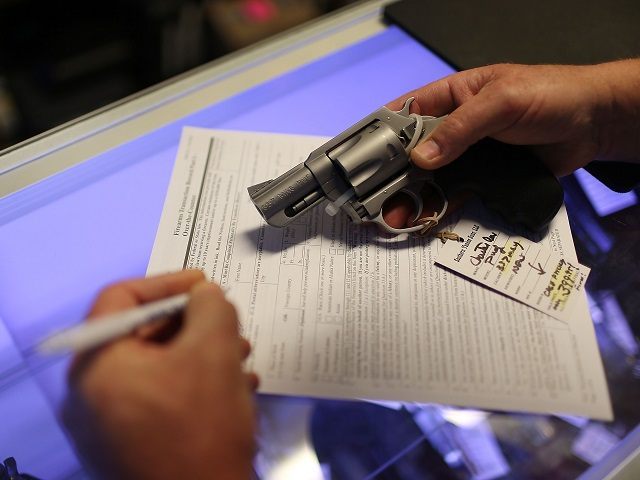In his latest book, The War on Guns: Arming Yourself Against Gun Control Lies, John R. Lott Jr. shows that states with “universal” background checks had more deaths and injuries since 2013.
It should be noted that “universal” background checks are the same thing as “comprehensive” background checks. Hillary Clinton and her surrogates in the gun control lobby consistently call for “comprehensive” background checks as a solution to mass public shootings and other high-profile firearm-related crimes.
Lott notes that “universal” background checks only exist in eight states, and six of those states “didn’t adopt them until 2013 to 2015.” So he caveats his findings by granting that “eight states is a small sample,” and the data from those states is small as well. Yet the extant data shows that “since 2013, states with ‘universal’ background checks have experienced 124 percent more mass public shootings and dramatically higher rates of death and injury.” In fact, “per capital, there were 267 percent more deaths and 1,431 percent more injuries.”
The examination of eight states over a short time period is balanced by Lott’s study of 19 states over the longer time period of 2000-2015. Lott wrote, “During at least part of the time period from 2000-2015, nineteen states (plus Puerto Rico and DC) had background checks on the private transfer of guns for at least part of that period.” Because at least one state canceled its background check requirement during that period, Lott stressed that “states are only counted as having background checks on at least some private transfers during the years in which the regulations were in effect.”
His findings — “States with background checks had a 15 percent higher per capita rate of mass public shooting deaths and a 38 percent higher rate of injuries.”
Mass public shootings increased in states with background checks on private transfers during the time period 2000-2015 as well, but Lott labeled the increase as “very [slight]” at .44 percent.
Because of the limited data on the “universal” checks specifically, Lott is careful to avoid drawing large conclusions. But he does stress that his findings show there is no support for claims that more checks would have stopped the Umpqua Community College attack (Oregon, October 1, 2015), the Colorado Springs Planned Parenthood attack (Colorado, November 27, 2015), and the San Bernardino terror attack (California, December 2, 2015). These were the three most recent attacks at the time Lott was writing his book.
Lott writes:
People just assume that expanded background checks will stop these mass public shootings. Yet there has been no attempt to provide even the most basic statistical evidence. None of these shootings, nor others [that President Obama and Clinton have] mentioned, would have been stopped if background checks on private transfers had been required. The three most recent massacres occurred in states–California, Colorado, and Oregon–which already have such laws in place. Mass public shootings have recently occurred in France, Belgium, Norway, Germany, and other European countries where these background checks also exist.
AWR Hawkins is the Second Amendment columnist for Breitbart News and political analyst for Armed American Radio. Follow him on Twitter: @AWRHawkins. Reach him directly at awrhawkins@breitbart.com.

COMMENTS
Please let us know if you're having issues with commenting.